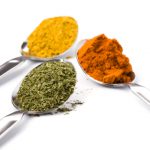Turmeric, cinnamon, and other spices fight oxidative stress from high-calorie meals, a study suggests.
When it comes to beating oxidative stress, could spices be our ultimate culinary defender? Results from a just published study in the August issue of the Journal of Nutrition reveal that adding spices such as turmeric and cinnamon may bestow some protection from the harmful effects of eating meals high in fat or calories.
“Normally, when you eat a high-fat meal, you end up with high levels of triglycerides, a type of fat, in your blood,” said Sheila West, lead author of the study and associate professor of biobehavioral health at Penn State. “We found that adding spices to a high-fat meal reduced triglyceride response by about 30 percent, compared to a similar meal with no spices added.”
The study involved analyzing the blood of six healthy, overweight (BMI 25-27) men after they ate a control meal (1200 calories, 49 grams of fat) without added spices, and then after they ate the same meal with added spices. Subjects’ blood was tested every 30 minutes after the meal for 4 hours. The control meal consisted of a coconut chicken and white rice entree, cheese bread, and a dessert biscuit; the experimental meal was nutritionally identical but also used a spice mixture to create a chicken curry, Italian herb bread, and a cinnamon biscuit.
To be sure that the subjects’ overall diet did not alter the test results, they were provided the following instructions: 1) avoid foods high in antioxidants for two days prior to testing, and 2) keep a food diary, which was checked for compliance. Four hours before the test meal they were given a low-antioxidant control meal and were also instructed to not consume any other food or drink for 12 hours before the test other than the provided meal.
The addition of spices to the meal reduced the levels of insulin and triglycerides in the blood—21 percent and 31 percent respectively— compared to the control meal. The spiced-up meal also increased certain antioxidant measures in the subjects’ blood, a finding similar to related studies examining the antioxidant potential of fruits and tea.
Foods high in antioxidants are believed to be one of the best defenses against oxidative stress and may help support optimal health over time. With this in mind, the United States Department of Agriculture (USDA) has created extensive databases of different foods’ antioxidant activity. More specifically, they’ve compiled a database that measures a food’s oxygen radical absorbance capacity (ORAC), and the higher ORAC score a food has the more antioxidant potential it has in the body. Many people are familiar with fruits, vegetables, and tea being high in antioxidants, but it may be a surprise to many that according to the USDA’s ORAC database spices have some of the highest ORAC value of all food components!
With the high ORAC value of spices further supported by the current study, isn’t it time to spice things up? The spice blend used in the study included nine different spices: black pepper, cinnamon, cloves, garlic powder, ginger, oregano, paprika, rosemary, and turmeric—all of which can easily be added to a variety of meals. Of the spices in the blend, however, cinnamon, turmeric, and oregano had the highest ORAC values. Cinnamon on morning oatmeal anyone? Turmeric and oregano in casseroles, curries, or rice dishes? The possibilities are endless.
Reference: Skulas-Ray AC, Kris-Etherton PM, Teeter DL, Chen CY, Vanden Heuvel JP, West SG. A high antioxidant spice blend attenuates postprandial insulin and triglyceride responses and increases some plasma measures of antioxidant activity in healthy, overweight men. J Nutr 2011;141:1451-7. doi: 10.3945/jn.111.138966
Related Posts
- Living Healthier, Longer with Ageless Essentials Daily Pack
- Human Trials Review: Resveratrol “Softens” Effects of Again
- How to Feel Younger and More Energized
- Dairy Helps Fight Oxidative Stress in Obesity
- Green Tea May Add to Protection Against UV Rays
The post Spice Meals Up With Turmeric and Cinnamon to Fight Oxidative Stress appeared first on Isagenix Health.
Source: IsagenixHealth.net


You May Also Like
Post-Workout Super Shake
Winter Trail Mix
Apple Spice Granola
IsaDelight Bark With Caramel Brulée Drizzle
Caramel Brulée Cookie Dough Bites
Homestyle Chicken Noodle Soup
BĒA Super Sparkler
Peppermint Mocha Shake
IsaDelight Cashew Butter Cups
Plant-Based Banana Bread
Nature Oat Bake Granola
Nature Oat Bake Isa-Cream Sandwiches
Nature Oat Bake Skewers
BEA Mango Mimosa Slushie
Plant-Based Strawberry Ice Cream
Plant-Based Strawberry Crepes
Plant-Based Strawberry Muffins
Superpower Elixir
Plant-Based Maple Pecan Protein Balls
Immune-Boosting Oats
Celebration BĒA Sparkler
Bone Broth Chicken Gravy
Kale & Sausage Bone Broth Soup
IsaDelight Reindeer Bark
Holiday Charcuterie Board
Leftover Turkey and Vegetable Soup
Protein Chocolate Mug Cake
Vanilla Protein Coffee Creamer
Greens Lavender Iced Matcha Latte
Isagenix Greens Salad Dressing
Everyday Ginger-Infused Cleanse Tea
Choco-Lava Mug Cake